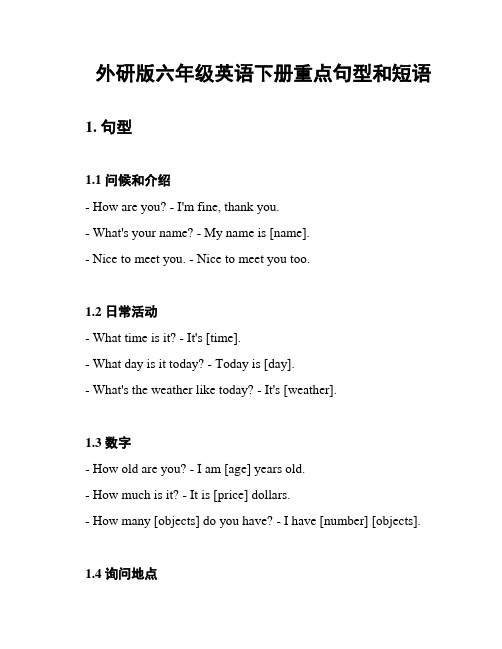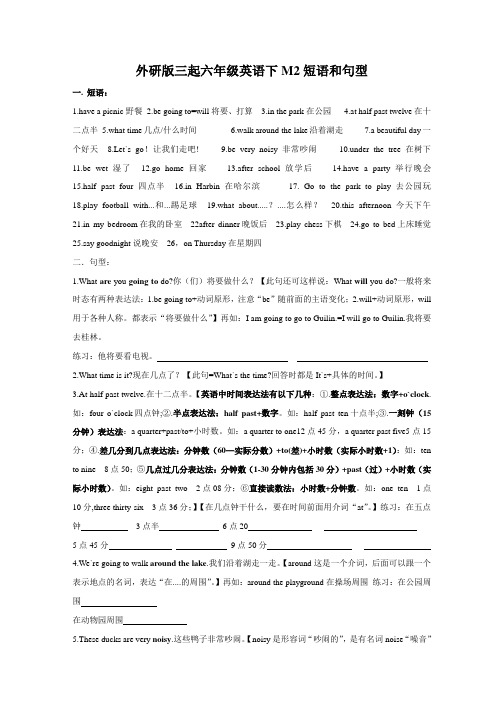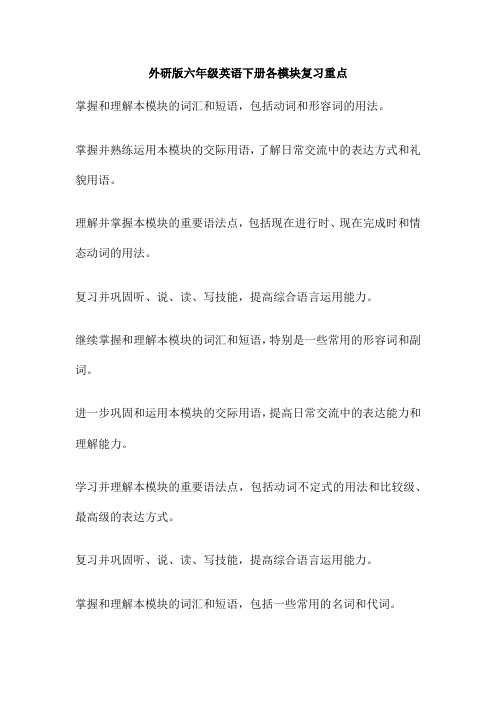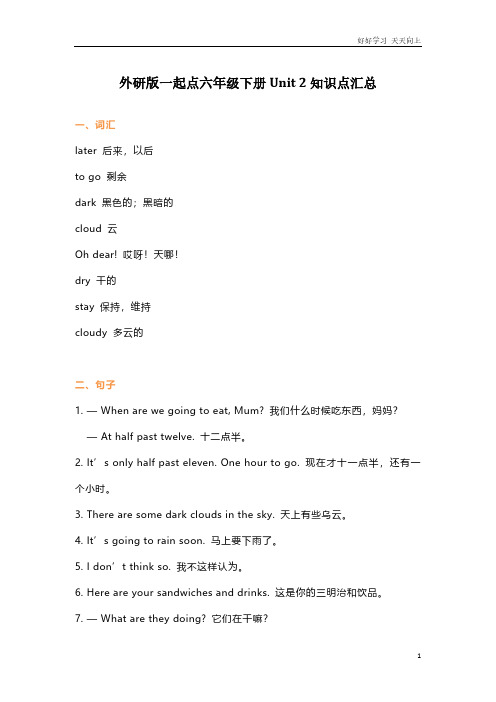外研社六年级下册英语复习提纲-短语+句型
外研版六年级英语下册重点句型和短语

外研版六年级英语下册重点句型和短语1. 句型1.1 问候和介绍- How are you? - I'm fine, thank you.- What's your name? - My name is [name].- Nice to meet you. - Nice to meet you too.1.2 日常活动- What time is it? - It's [time].- What day is it today? - Today is [day].- What's the weather like today? - It's [weather].1.3 数字- How old are you? - I am [age] years old.- How much is it? - It is [price] dollars.- How many [objects] do you have? - I have [number] [objects].1.4 询问地点- Where is [place]? - It's [location].- How can I get to [place]? - You can go [direction].1.5 询问喜好- What's your favorite [food/subject/color]? - My favorite [food/subject/color] is [favorite].2. 短语- Hello, how are you? - 你好,你好吗?- I'm fine, thank you. And you? - 我很好,谢谢。
你呢?- What's your name? - 你叫什么名字?- My name is [name]. - 我叫[name]。
六年级下册英语短语句型

Module 1 ChangesUnit 1 Xiao ling’s New ApartmentPart 1 短语1. Welcome to…欢迎来到……2. Let me + 动词原形让我……Let us (Let’s)+ 动词原形让我们……3. between A and B 在A和B之间4.连词and 1. 表示“并列”关系;2. 意为“和;以及”3. 模式:A and B A和Bbut 1.表示“转折”;2.意为“但是;可是;然而……”4. 判断依据:两个句子中出现相对的意思5. 模式:句子1,but 句子2so 1.表示结果;2.意为“所以;因此;于是……”3.判断依据:存在原因和结果的关系4.模式:(原因)句子,so (结果)句子5.A +be动词(is/are)+ far away from B A 距离B很远6. A + be动词+ near to B A在B 附近7. A + be动词+close to B A 接近B8.不定代词单数= 1 (is) this 这个 that 那个复数≥2 (are) these 这些 those 那些Part 2 形容词比较级A.本单元的形容词原形比较级原形比较级small bigbright darklarge nearclose prettycomfortableB.形容词的比较级和最高级比较级最高级以单音节词及ly/er/ow结尾的形容词 + er + est单音节词以e结尾的形容词 + r + st重读闭音节要双写末尾字母 + er + est多音节形容词要在前面 + more +most由分词演变的形容词要在前面 + more +most以辅音字母+ y 结尾的形容词 y – ier y –iestB.不规则形容词原级比较级最高级good/well(好的) better bestbad(坏的) worse worstlittle(少的) less leastmuch/many(多的) more mostfar(远的) further furthestold(老的) older/elder oldest/eldestC.比较级语法公式1.两种物品的比较(2种)或同种事物的前后比较“A”+be动词+形容词比较级(-er/more 形容词)+than “B”注意:much放在比较级前可加强“程度”2.三种以上的物品的比较“A“+ be 动词+the+最高级(形容词est/most 形容词)…注意:“序数词” 一般放在the 和最高级之间如:the first biggest3.the+比较级…,the+比较级=== 越……越……4.比较级and 比较级===越来越……如:more and more…越来越多……Part 3 句型1.反意疑问句:(1)陈述部分肯定式+疑问部分否定式They work hard, don’t they?他们努力工作,不是吗?Yes, they do.对,他们工作努力。
(外研版三起)小学六年级下册英语:M2短语和句型汇总

外研版三起六年级英语下M2短语和句型一.短语:1.have a picnic野餐2.be going to=will将要、打算3.in the park在公园4.at half past twelve在十二点半5.what time几点/什么时间6.walk around the lake沿着湖走7.a beautiful day一个好天8.Let`s go!让我们走吧!9.be very noisy非常吵闹10.under the tree在树下11.be wet湿了12.go home回家13.after school放学后14.have a party举行晚会15.half past four四点半16.in Harbin在哈尔滨17. Go to the park to play去公园玩18.play football with...和...踢足球19.what about.....?....怎么样?20.this afternoon今天下午21.in my bedroom在我的卧室22after dinner晚饭后23.play chess下棋24.go to bed上床睡觉25.say goodnight说晚安26,on Thursday在星期四二.句型:1.What are you going to do?你(们)将要做什么?【此句还可这样说:What will you do?一般将来时态有两种表达法:1.be going to+动词原形,注意“be”随前面的主语变化;2.will+动词原形,will 用于各种人称。
都表示“将要做什么”】再如:I am going to go to Guilin.=I will go to Guilin.我将要去桂林。
练习:他将要看电视。
2.What time is it?现在几点了?【此句=What`s the time?回答时都是It`s+具体的时间。
(完整版)最新外研版小学六年级英语下册知识点归纳复习

新外研版六年级下册英语知识点归纳Module 1一、单词短语:h amburger 汉堡包 cola 可乐 juice 果汁 dollar 美元 cent 美分 restaurant 餐厅 menu 菜单 cashier 收银员 careful 小心的 Be careful 小心点 look 看上去 enjoy 享受,享用二、句子句型:1.Can I help you? (店员)我能帮助你吗?2.Can you help me?(客人)你能帮助我吗?3.I (don’t) know. 我(不)知道。
4. Here’s (单数) Here’re (复数) 给你… Here you are .给你5. — How much is it?这个多少钱?(一般疑问句) — It’s 数字dollar(s)./ It’s 数字cent(s) 几美元/几美。
6. — What do you want (to eat / drink) ?你想要(吃点/喝点)什么? I want …… 7.Enjoy your meal! 享受你的大餐吧!8.in all 一共,总共三、单词复习:chicken鸡肉 rice 米饭 drink 喝的,饮料 noodles 面条 meat 肉 vegetable 蔬菜 tea茶叶 hot dog 热狗 cheese 奶酪 milk牛奶 fish 鱼,鱼肉Module 2一、单词短语duck 鸭子 pond 水池 cloud 云 picnic 野餐,野炊dry 干的dark 黑的,暗的to go剩余naughty 调皮的;顽劣的stay 保持,维持later 后来,以后like 想......一样look like 看起来好像 have a picnic 去野餐,吃野餐 walk around the lake 绕湖而行 go under the tree 去树下面 Let’s + V 原型,让我们...... go to the park 去公园 go to bed 去睡觉 play chess 下象棋look at 看 at + 点钟在几点钟二、句子句型:1.What time is it?几点了? It’s 整点:数字 o’clock (几点整) half past + 数字(几点半)2.going to rain/snow/be windy/······将要下雨/下雪/刮风△将来时:3. be going to = will 计划和将要发生事be: am are is我是am 你是are, is 连着他她它,两个以上都用are例如:.问:When are we going to go eat(动原)? 我们什么时候去吃东西?答:We are going to eat at half past twelve. 我们将在十二点半吃。
小学英语六年级下学期unit3单词、短语、句型、语法

⼩学英语六年级下学期unit3单词、短语、句型、语法六英下U3(知识点)词汇表healthy 健康的diet饮⾷a little⼀点a few ⼏个at a time ⼀次cola 可乐need 需要vegetable 蔬菜porridge 粥steamed bun 馒头western 西⽅的cereal ⾕类,麦⽚meal (⼀顿)饭、餐sausage ⾹肠词组短语1.like eating sweets and ice cream喜欢吃糖和冰激凌2.like drinking water喜欢喝⽔3.drink a little water every day每天喝⼀些⽔4.have some bread and milk for breakfast早餐吃⾯包喝⽜奶5.for lunch and dinner对于早餐和午餐6.have a lot of rice吃许多⽶饭7.some fish⼀些鱼⾁8.have a few eggs every week每周吃⼏个鸡蛋9.have a healthy diet有⼀个健康的饮⾷10.have a lot of noodles for breakfast早餐吃许多⾯条11.eat an egg吃⼀个鸡蛋12.eat some meat and some vegetables吃⼀些⾁和⼀些蔬菜13.only eat a little rice只吃⼀些⽶饭14.like sweet food喜欢甜⾷15.eat a little at a time每次吃⼀点16.eat some fruit吃⼀些⽔果17.in the afternoon and evening在下午和晚上18.the following words下⾯的单词19.some potatoes⼀些⼟⾖20.many tomatoes许多西红柿21.get out出去22.Chinese people中国⼈23.have some porridge喝些粥24.steamed buns馒头25.western people西⽅⼈26.have cereal and sausage for breakfast早饭吃⾕类和⾹肠27.have to go to the supermarket不得不去超市28.want to come with me想要和我⼀起来29.see some drinks看见⼀些饮料30.take a small bottle拿⼩瓶的31.drink too much cola喝太多可乐32.want this big fish想要这只⼤鱼33.need a lot of rice需要许多⽶饭34.take the big bag拿⼤包的35.go home回家36.too heavy太重37.have a rest休息38.in a healthy diet在⼀个健康的饮⾷中39.have some meat and fish in your meals在吃饭时吃些⾁和鱼40.eat only a little sweet food只吃⼀点甜⾷句型1.What do you have for breakfast? 你早饭吃什么?/doc/0380fbdd284ac850ad0242c1.html k is good for your body. ⽜奶对你的⾝体有益。
六年级英语下册 M3短语和句型汇总 外研版(三起)

外研版三起六年级英语下M3重点短语和句型一、短语:1.How are you?你好吗?2.have a funny day玩得愉快=have agood time3.a funny day愉快的一天4.on Saturday在星期六5.have a picnic野餐6.in the park在公园里7.send photos寄照片8.in China在中国 9.write soon快些回信 10.Here are.....这些是...... 11.in this photo在这张照片里 12.in the tree(s)在树上 13.look at...看.... 14.look hungry看起来饿了 15.under the tree在树下 16.eat our picnic吃我们的野餐 17.in the water在水里 18.look out of....向....外面看 19.out of...往外..... 20.on the train在火车上 21.wear a big hat戴一顶大帽子 22.go up the hill上山(go up向上走) 23.go down the hill下山(go down向下走) e to the station来到车站 25.on the sea在大海上 26. the middle of the night午夜( the middle of...在...的中心)27.in the sky在天空 28.after the day白天过后 29.be wrong错的 30.be very bad 真坏 31.spoil my fun破坏了我的快乐二、句型:1.I had a very funny day on Saturday.上个星期六我玩的很开心。
【had表示的是过去式。
一般过去时态是表示过去某一时间经常发生的动作和存在的状态。
常与过去时间状语连用,如:yesterday,last year,an hour ago,just now,once upon a time,on the first day of May,2007;in the old days;等等。
外研版六年级英语下册各模块复习重点

外研版六年级英语下册各模块复习重点掌握和理解本模块的词汇和短语,包括动词和形容词的用法。
掌握并熟练运用本模块的交际用语,了解日常交流中的表达方式和礼貌用语。
理解并掌握本模块的重要语法点,包括现在进行时、现在完成时和情态动词的用法。
复习并巩固听、说、读、写技能,提高综合语言运用能力。
继续掌握和理解本模块的词汇和短语,特别是一些常用的形容词和副词。
进一步巩固和运用本模块的交际用语,提高日常交流中的表达能力和理解能力。
学习并理解本模块的重要语法点,包括动词不定式的用法和比较级、最高级的表达方式。
复习并巩固听、说、读、写技能,提高综合语言运用能力。
掌握和理解本模块的词汇和短语,包括一些常用的名词和代词。
学习和掌握本模块的交际用语,了解不同场景下的表达方式和应对策略。
学习并理解本模块的重要语法点,包括名词复数形式和一般将来时的用法。
复习并巩固听、说、读、写技能,提高综合语言运用能力。
继续掌握和理解本模块的词汇和短语,包括一些常用的动词和形容词。
巩固和运用本模块的交际用语,提高日常交流中的表达能力和应对能力。
学习并理解本模块的重要语法点,包括一般现在时和特殊疑问句的用法。
复习并巩固听、说、读、写技能,提高综合语言运用能力。
掌握和理解本模块的词汇和短语,包括一些常用的动词短语和介词短语。
巩固和运用本模块的交际用语,提高日常交流中的表达能力和应对能力。
学习并理解本模块的重要语法点,包括现在完成时的用法和情态动词的用法。
随着课程的深入,我们已经来到了小学英语的最后阶段。
在这个关键时期,一份精心设计的总复习课件对于学生们掌握和巩固所学知识,以及准备接下来的升学考试至关重要。
今天,我们将一起探讨如何制作一份有效的“外研版英语六年级下册总复习课件”。
在制作课件之前,我们需要明确课件的目标。
对于总复习课件,目标应该包括:通过各种活动和练习,加深学生对英语的理解和运用;词汇复习:将本学期的重点词汇进行整理,并配以图片和例句,方便学生记忆。
外研版一起点六年级下册Unit 2知识点汇总

外研版一起点六年级下册Unit 2知识点汇总一、词汇later 后来,以后to go 剩余dark 黑色的;黑暗的cloud 云Oh dear! 哎呀!天哪!dry 干的stay 保持,维持cloudy 多云的二、句子1. — When are we going to eat, Mum? 我们什么时候吃东西,妈妈?— At half past twelve. 十二点半。
2. It’s only half past eleven. One hour to go. 现在才十一点半,还有一个小时。
3. There are some dark clouds in the sky. 天上有些乌云。
4. It’s going to rain soon. 马上要下雨了。
5. I don’t think so. 我不这样认为。
6. Here are your sandwiches and drinks. 这是你的三明治和饮品。
7. — What are they doing? 它们在干嘛?— They are eating our sandwiches. 它们在吃我们的三明治。
8. It looks like you’re going to stay hungry, Simon! 看起来你要挨饿了,西蒙。
9. It will be sunny in Harbin. 哈尔滨将会是晴天。
10. It will be cloudy in Tianjin. 天津将会是多云。
11. It will snow in Beijing. 北京将会下雪。
12. — What will the weather be like in Beijing? 北京的天气将会怎么样?— It will be sunny. 将会是晴天。
13. — What are we going to do today? 今天我们要干嘛?— We are going to the park. 我们要去公园。
- 1、下载文档前请自行甄别文档内容的完整性,平台不提供额外的编辑、内容补充、找答案等附加服务。
- 2、"仅部分预览"的文档,不可在线预览部分如存在完整性等问题,可反馈申请退款(可完整预览的文档不适用该条件!)。
- 3、如文档侵犯您的权益,请联系客服反馈,我们会尽快为您处理(人工客服工作时间:9:00-18:30)。
英语六年级下复习提纲第一课时Module 1重点:学会点餐用语,注意单复数1.Can I help you? (店员)我能帮助你吗?2.Can you help me? (客人)你能帮助我吗?3.I (don’t) know. 我(不)知道。
4.Here’s (单数) Here’re (复数) 给你…5.Here you are .给你6.How much is it?多少钱?一般疑问句回答:It’s 数字dollar(s) . 数字cent(s) 几美元.几美分6.Enjoy your meal! 享受你的大餐吧!What do you want ?你想要些什么I want7.in all 一共,总共单词复习:chicken鸡肉rice 米饭drink 喝的,饮料Noodles 面条vegetables蔬菜第二课时Module 2学会表达时间,用英语预报天气熟练掌握what are you going to +动词原形熟练掌握be going to句型中,be 动词的相应变化1.have a picnic 去野餐,吃野餐2.What time is it?几点了?3.整点:数字+ o’clock半点:half past + 数字4.walk around the lake 绕湖而行5.Let’s 让我们6.go under the tree 去树下面7.go to the park 去公园8.go to bed 去睡觉9.play chess 下象棋10.look at 看11.going to rain/snow/windy/······将要下雨/下雪/刮风△将来时:12.be going to = will 计划和将要发生事例如:@1.When are we going to go eat(动原)?我们什么时候去吃东西?回答:We are going to eat at half past twelve.我们将在十二点半吃。
@2. what are you going to +动词原形你将要去干什么?I am going to ······13.at + 点钟在几点钟第三课时Module 3熟练掌握现在进行时1.on + 星期在星期几2.There is / are / was / were 有3.lots of = a lot of 许多4.start to 动原开始做某事5.take photos 照相6.go home 回家7.in / on the tree 在树上8.主语+ be + 动词ing 现在进行时公式例如:The sun is shining 阳光灿烂I’m watching TV 我在看电视现在分词变化规则1.动词后+ing;2.动词以不发音的e结尾,去掉e+ing; make-making take-taking ride-ridingcome-coming have-having dance-dancing9.be angry with 对····生气10. a funny day 有趣的一天11.Make snowman 堆雪人12.Middle of the night 半夜13.In the sky 在空中14.Spoil my fun 坏了我的兴致第四课时Module 4用英语寻求帮助,描述某人正在做某事1 / 52 / 5 1. at / in the supermarket 在超市2. come out 出来3. come in 进来4. help me 帮助我5. hold on to 握住6. fall down 跌落7.fly away 飞走run away 跑开go away 走开8. a birthday party 生日派对9. make a birthday card 做生日贺卡10. Be careful 小心11. Pick up the apples 捡起苹果12. Get on 上车13. Got off 下车14. Walk to the blackboard 走向黑板语法(一) 情态动词can ,表示能够干什么肯定句:主语+can+动词原型+其它。
I can carry this bag.我能拿这个包否定句:主语+can ’t+动词原型+其它。
I can ’t carry this bag.我不能拿这个包。
一般疑问句:Can+主语+动词原型+其它?Can you help me ?你能帮助我吗?肯定回答:Yes ,I can .否定回答:sorry, I can ’t. 练习1 I can play football (改为一般疑问句,并作出回答) 2 You can sit on the chair.(改为否定祈使句)3 They can jump high .(就划线部分提问)4 She is doing her homework .(改为否定句;一般疑问句;就划线部分提问)第五课时Module 5能运用功能句谈论正在做一件事情时另一件事情同时发生。
3. but then 但是在那时4. say to 和······说 15. try again 再试一次 16. run in 跑进······里 17. eat dinner 吃晚餐 18. Starting to cross 正过马路 19. Talking to friend 和朋友聊天 20. Wake up from my dream 从梦中醒来 二、用进行时谈论或描述正在发生的事情 I’m flying in the sky.我正在天空飞 I’m looking out of the window.我正看向窗外 第六课时 Module 6:谈论过去发生的事情。
(过去式) 1. Thank you!谢谢你 You ’re welcome! 不客气 2.be interested in 1. What + (an / a) +形容词 + 名词! 感叹句2. give 物 to 人 = give 人 + 物 把某物给某人3. send 某人 into 某地 把某人送到某地4. a model of 一个·····的模型5. the name of ······的名字句型:I bought a book for you. 我买了一本书给你 Who gave it to you? 谁给你的? China sent a man into space. 中国送了一个人进太空 重难点:熟练掌握:buy, give, send 等不规则动词的过去式 第七课时 Module 7叙述过去已经发生的事情(过去时) 1. fly (flew) into 飞进····里名词 对某物感兴趣 动词ing 对做某事感兴趣2.in space 在太空3.work(ed) hard 努力工作4.at / in school 在学校e (came) true 实现6.first words 第一句话7.be proud of 以···而骄傲8.love / like +动词ing 喜欢做某事9.make(made) a video 制作录像10.spent about 21 hours 大约花了21小时11.inside ---- outside (反义词) 里面——外面12..hour 小时an hour 一小时13.China’s first man 中国第一人14.in October 2003 在2003年10月特殊过去式的单词fly -- flew become -- becamespend -- spent see -- saw make – made第八课时Module 8能用“could,couldn’t”来描述海伦过去所具备和不具备的能力。
1.be born in 出生于2.in + 年份在哪一年3.try (tried) hard 努力尝试4.try to do sth 尝试做某事5.learn to +动原学习做某事6.It’s difficult to 动原for 某人做某事对某人来说是困难的7.went around the world 环游世界8.tell story 讲故事9.help 某人(to)+动原帮助某人做某事10.put 某物in 某地把某物放入某地11.first word 第一个单词12.talk to 和·····谈话13.can / can’t / could /couldn’t 后接动词原形14.wrote a book about herself 写一本关于她自己的书第九课时Module 9:学习正确表达如何询问原因及做出合理的回答会正确用这些单词来描述状态:happy sad angry hungry thirsty tired afraid1.on your head 在你的头上2.in your hand 在你的手里3.play baseball 打棒球4.It’s easy to 动原for 某人做某事对某人来说是简单的5.have got = ‘ve got 有6.escape from 从···逃离学会用why问问题,because 回答例如why are you wearing a raincoat?为什么你穿着雨衣Because it’s going to rain 因为正在下雨Module 101.go back to 回去2.be useful for 对····有用3.by bus 乘坐公共汽车4.practice English 练习英语第十课时一、名词复数规则1.一般情况下,直接加-s,如:book-books, bag-bags, cat-cats, bed-beds2.以s. x. sh. ch结尾,加-es,如:bus-buses, box-boxes, brush-brushes, watch-watches3.以“辅音字母+y”结尾,变y为i, 再加-es,如:3 / 5family-families, strawberry-strawberries4.以“f或fe”结尾,变f或fe为v, 再加-es,如:knife-knives5.不规则名词复数:man-men, woman-women, policeman-policemen, policewoman-policewomen, mouse-mice child-childrenfoot-feet,.tooth-teethfish-fish, people-people, Chinese-Chinese, Japanese-Japanese二、一般现在时一般现在时基本用法介绍【No. 1】一般现在时的功能1.表示事物或人物的特征、状态。
